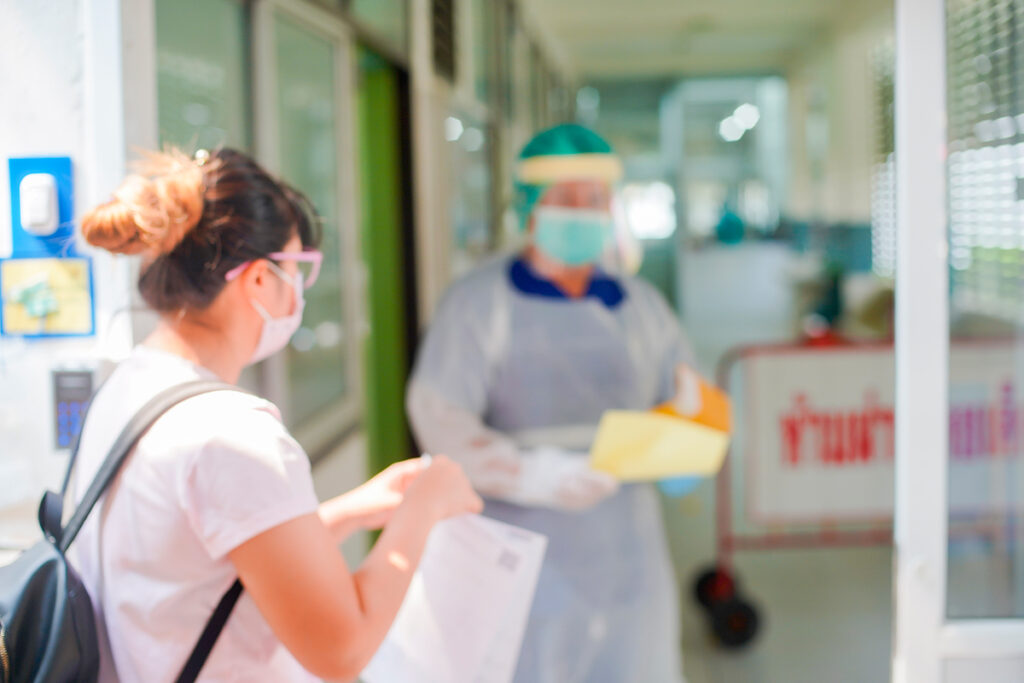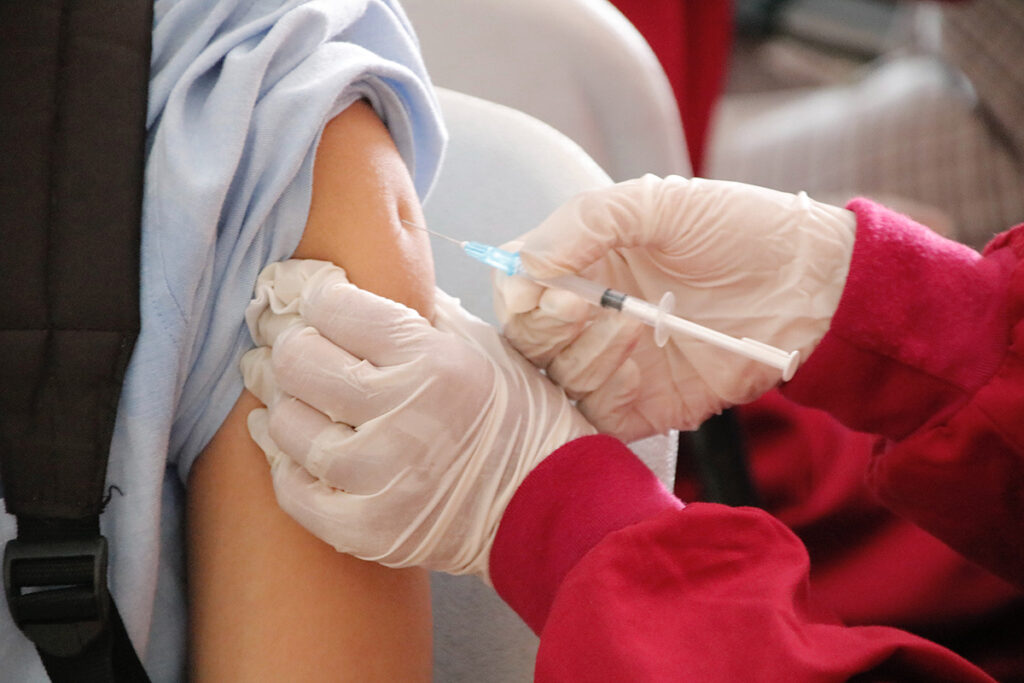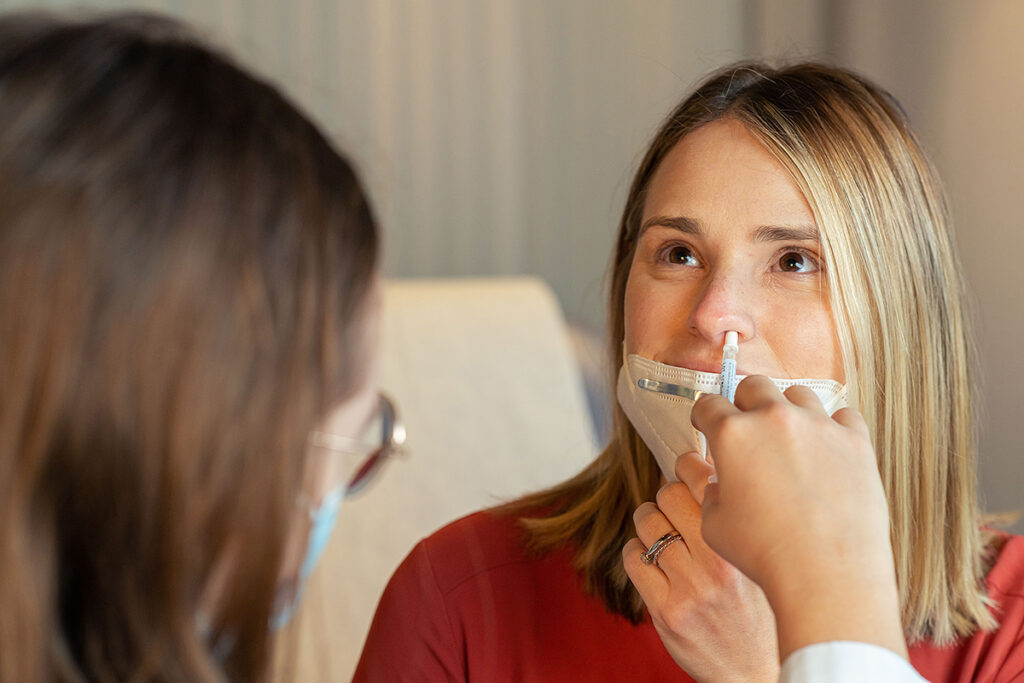Ideally, the COVID-19 vaccine provides reliable and long-term immunity to the disease. In reality, immune defenses weaken over time, and new strains reduce the effectiveness of the vaccine. Fully vaccinated people can also get sick and be contagious. However, the severity of COVID-19 is significantly lower than that of the unvaccinated. They also have less infectiousness and duration of the disease, and the immune system copes with the virus faster.
This article summarizes the world’s experience in observing and treating people who have received the coronavirus vaccine. Further in the article:
- world statistics of people vaccinated, but subsequently ill with the Delta or Alpha strain;
- studies of the course of the disease in vaccinated and unvaccinated people: duration and severity of the illness, the kinetics of viral load and production of protective antibodies, analysis of infectivity;
- recommendations of study authors and public health authorities for vaccinated people.
All information is provided with links to articles in scientific journals and websites of medical organizations.
Content
- Statistics and Cases of Infection Of People Vaccinated Against COVID-19
- Studies of The Course Of COVID-19 in Vaccinated and Unvaccinated People
- Study Guidelines and Public Health Authorities for Vaccinated People
- Сonclusions
- Sources
Statistics and Cases of Infection Of People Vaccinated Against COVID-19
Since the beginning of the vaccination campaign against coronavirus infection, doctors in different countries have accumulated data on the sick among the vaccinated. However, experts themselves point out that the data obtained can only be the tip of the iceberg since vaccinated people without significant clinical symptoms do not seek medical help and are less likely to undergo PCR testing.
Singapore (Delta strain)
Two vaccines are approved and used in Singapore: Pfizer / BioNTech and Moderna. First of all, the elderly and people with an increased risk of infection, for example, medical workers, were vaccinated. As of 19.07.2021, 2 792 430 people were vaccinated, 47% of the total population.
Experts have evaluated the effectiveness of vaccination against the Delta strain coronavirus. We used data from patients with confirmed COVID-19 hospitalized from April 1 to June 14, 2021, at one of five medical centers. In total – 218 people, of which:
- 71 (33%) – fully vaccinated;
- 13 (6%) – partially vaccinated: received one dose of vaccine more than 14 days before illness;
- 130 (60%) – not vaccinated.
A comparison of COVID-19 in vaccinated and unvaccinated people is described later in this article. Details are published on the medRxiv medical research preprint server.
USA (Delta strain)
In July 2021, mass events were held in one of the counties of Massachusetts, attended by tourists from all over the country. As a result, there was an outbreak of coronavirus infection. From 6 to July 25, 2021, 469 cases of COVID-19 were reported. Of them:
- 346 (74%) – fully or partially vaccinated with Johnson & Johnson, Moderna, or Pfizer / BioNTech vaccines;
- 123 (26%) – not vaccinated.
The Delta coronavirus was detected in 28% of cases. A comparison of the viral load of vaccinated and unvaccinated people is described later in this article. Details are published on the website of the US Centers for Disease Control and Prevention.
In another case, doctors in Wisconsin studied the spread of the SARS-CoV-2 coronavirus among vaccinated and unvaccinated people. The research was carried out during the period of an increase in the incidence of the Delta strain: from June 29 to July 31, 2021. During this period, experts analyzed 719 respiratory samples. Of them:
- 311 (43%) – fully vaccinated;
- 408 (57%) – not vaccinated.
Delta strain was detected in 69% of cases. The study of vaccinated but infected with high viral load and asymptomatic COVID-19 is described later in this article. Details are published on the medRxiv medical research preprint server.
UK (strains Alpha and Delta)
From May 2020 to July 2021, British doctors evaluated the transmission of COVID-19 in the population. The work was divided into 13 stages of 20-25 days each. At each stage, specialists randomly selected approximately 100,000 – 150,000 people without repetition. Each participant underwent PCR analysis and recorded the presence of symptoms of the disease. In total, more than 1.9 million people were examined.
At stages 12 and 13, conducted from May to July 2021, doctors additionally analyzed the incidence in vaccinated people. From May 20 to June 7 (stage 12), the incidence of COVID-19 among those who received the vaccine was 3 times lower than among the unvaccinated. From June 24 to July 12 (stage 13), 44% of cases were already vaccinated. A possible reason for the increase in the incidence among the vaccinated is that the Delta strain completely replaced the Alpha strain during this period.
From late May 2021 to early July 2021, the UK ran a high-coverage vaccination campaign. The priority in receiving the vaccine was among the older generation and the elderly. Pfizer/BioNTech and Oxford/AstraZeneca vaccines are used for vaccinations in the UK. Details of the work are published in the final report on the website of Imperial College London.
Israel (strain Alpha)
From January 24 to April 3, 2021, Israeli specialists studied the effectiveness of the COVID-19 vaccination campaign. During this period, the Alpha strain of the SARS-CoV-2 coronavirus dominated the country. The only vaccine available in Israel is Pfizer / BioNTech.
72% (~ 4,700,000) of people over 15 years old were vaccinated with two vaccine doses during the vaccination campaign. The calculated incidence rate per 100,000 people per day was:
- 91.5 – in unvaccinated people;
- 3.1 – in fully vaccinated people.
The vaccine efficacy was 94.2%. Details of the work are published in The Lancet.
Studies of The Course Of COVID-19 in Vaccinated and Unvaccinated People
Singapore (Delta strain)
The study, conducted from April 1 to June 14, 2021, involved 218 people with confirmed coronavirus infection (Delta strain). 84 participants were fully or partially vaccinated with Pfizer/BioNTech or Moderna vaccine. The remaining 130 people are not vaccinated.
The result of the study: in vaccinated but sick people, COVID-19 was more often asymptomatic. In the presence of symptoms, the vaccinated had better blood counts, fewer cases of pneumonia, a lower need for additional oxygen and intensive care, neutralizing antibodies were produced faster, and infectiousness passed more quickly. Comparative results of the two groups:
| Indicator | Fully vaccinated (2 doses) 71 people | Unvaccinated 130 people |
| Asymptomatic cases (%) | 20 (28,2%) | 12 (9,2%) |
| Fever (%) | 29 (40,9%) | 96 (73,9%) |
| Cough (%) | 27 (38%) | 79 (60,8%) |
| Shortness of breath (%) | 1 (1,4%) | 17 (13,1%) |
| Runny nose (%) | 27 (38%) | 31 (23,9%) |
| Sore throat (%) | 18 (25,4%) | 43 (33,1%) |
| Pneumonia (%) | 9 (21,7%) | 69 (53,1%) |
| Additional oxygen demand (%) | 2 (2,8%) | 27 (20,8%) |
| Need for intensive care (%) | 0 | 7 (5,4%) |
| Artificial lung ventilation (%) | 0 | 2 (1,5%) |
| Death (%) | 0 | 2 (1,5%) |
Similar results were found in the group of partially vaccinated people. Multivariate logistic regression analysis of the development of moderate COVID-19 showed that vaccination has a protective effect.
The study of the viral load dynamics showed that the initial stage of the disease is the same in vaccinated and unvaccinated people. However, in the vaccinated, the rate of decrease in viral load was higher: https://www.medrxiv.org/content/medrxiv/early/2021/07/31/2021.07.28.21261295/F1.large.jpg
The study found that vaccination reduced peak rates of systemic inflammation, reduced COVID-19 symptoms, and improved clinical outcomes. Singapore specialists emphasize that the rapid and widespread introduction of vaccination programs remains a crucial strategy in the fight against the COVID-19 pandemic. Study details are published on the medRxiv medical research preprint server.
USA (Delta strain)
Massachusetts and Wisconsin experienced massive outbreaks of COVID-19 in June and July 2021. In the first case, among the cases, 74% were fully or partially vaccinated. In the second case, 43% are fully vaccinated. In both instances, the vaccinated and unvaccinated people had similar viral load levels.
Doctors in Wisconsin took a closer look at the outbreak. They found that 8 vaccinated people had an asymptomatic infection but a high viral load (Ct <25): https://www.medrxiv.org/content/medrxiv/early/2021/08/11/2021.07.31.21261387. 1 / F1.large.jpg
Doctors tried to grow a live virus from smears obtained from testing to determine the infectivity of infected fully vaccinated people. As a result, a live virus of the Delta strain was isolated from 95% of vaccinated people samples. Research data suggests that those vaccinated against the coronavirus can become asymptomatic and contagious.
Details of the Massachusetts study are published on the US Centers for Disease Control and Prevention website. Details of the Wisconsin study are posted on the medRxiv medical research preprint server.
Study Guidelines and Public Health Authorities for Vaccinated People
On September 16, 2021, the US Centers for Disease Control and Prevention updated guidelines for vaccinated:
- Avoid people with COVID-19 symptoms. When caring for the sick – strengthen personal protection against infection;
- wear a mask in public transport and public areas;
- while traveling, further strengthen measures to protect yourself and loved ones: observe the social distance, avoid crowds and poorly ventilated rooms, wash hands and disinfect surfaces more often, cover your mouth with a mask or elbow when coughing or sneezing;
- in the case of a weakened immune system due to medications or concomitant illnesses, follow all preventive measures recommended for unvaccinated people unless the attending physician advises otherwise.
The full version of the guidelines is available on the official website of the US Centers for Disease Control and Prevention.
American doctors from Wisconsin, who investigated the infection of vaccinated people with the Delta strain, explain the risk to vaccinated. After being vaccinated against COVID-19, people may feel safer and less aware of the high risk of infection. As a result, these people will be less likely to comply with preventive and protective measures, pay less attention to their well-being, and be tested less often for coronavirus. If infected, these people will become carriers of the disease.
American experts emphasize that the vaccinated should:
- wear a mask indoors;
- maintain social distance;
- if you have symptoms of COVID-19, get tested for coronavirus.
Conclusions
COVID-19 vaccines effectively protect against serious illness and death. Vaccinated people get sick more easily, even if they are infected with the Delta strain. In vaccinated people, the disease is usually mild. Vaccinated immunocompromised people who are taking immunosuppressive drugs remain at risk.
The nature of the risk for all vaccinated persons is to reduce the feeling of danger after vaccination. These people may feel safer and less aware of the high risk of infection. As a result, they are less likely to comply with preventive and protective measures, pay less attention to their well-being, and are less likely to be tested for coronavirus. If infected, these people will become carriers of the disease.
Those vaccinated against the coronavirus can become asymptomatic and contagious.
Sources
- Virological and serological kinetics of SARS-CoV-2 Delta variant vaccine-breakthrough infections: a multi-center cohort study
- Outbreak of SARS-CoV-2 Infections, Including COVID-19 Vaccine Breakthrough Infections, Associated with Large Public Gatherings — Barnstable County, Massachusetts, July 2021
- Shedding of Infectious SARS-CoV-2 Despite Vaccination when the Delta Variant is Prevalent – Wisconsin, July 2021
- REACT-1 round 13 final report: exponential growth, high prevalence of SARS-CoV-2 and vaccine effectiveness associated with Delta variant in England during May to July 2021
- Impact and effectiveness of mRNA BNT162b2 vaccine against SARS-CoV-2 infections and COVID-19 cases, hospitalisations, and deaths following a nationwide vaccination campaign in Israel: an observational study using national surveillance data
- When You’ve Been Fully Vaccinated



